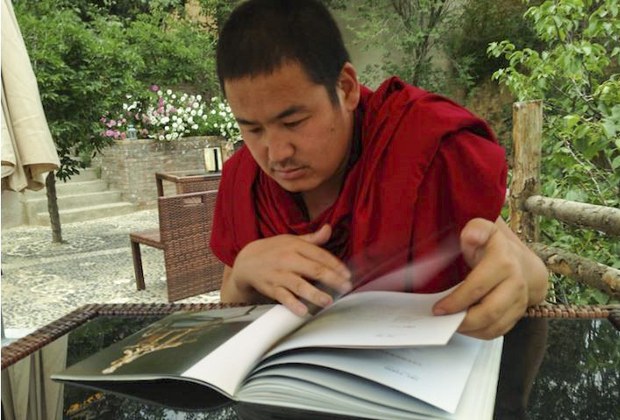Tibetan writer held by China for ‘discussing’ Dalai Lama
Share

Rongwo Gangkar, shown in an undated photo, “was arrested by the Chinese government for initiating a discussion about the Dalai Lama at a gathering,” a source has told RFA.
A prominent Tibetan writer who disappeared last year in Chinese custody was arrested for taking part in politically sensitive discussions about Tibet’s exiled spiritual leader the Dalai Lama, Radio Free Asia has learned.
Rongwo Gangkar, author of such popular works as The Knot and An InterviewWith Gendun Choephel, acollaboration with other writers, was taken into custody in western China’s Qinghai province more than a year ago, a source living in the region said.
“He was arrested by the Chinese government for initiating a discussion about the Dalai Lama at a gathering,” RFA’s source said, speaking on condition of anonymity for security reasons. “He was talking about how his Holiness’s birthday and other important events related to the Dalai Lama should be celebrated.”
The source said that Gangkar had been arrested outside Rongwo monastery in Rebgong (Tongren, in Chinese) county in Qinghai’s Malho (Huangnan) Tibetan Autonomous Prefecture after returning from Rebgong city, the county seat.
“We don’t know whether he has been convicted yet or not, but he is being held in a newly built prison in Rebgong county,” he added.
The exact date of Gangkar’s arrest is still unknown. Sources had previously reported Gangkar missing at the beginning of 2021.
Also speaking to RFA, a Tibetan living in exile said that Gangkar had taken part before his arrest in informal discussions on book-related topics with other writers at a tea shop called Muthak in Rebgong.
“The Chinese authorities are now watching this tea shop closely and are restricting it from holding any more gatherings and discussions like this,” the source said, also asking for anonymity in order to protect his contacts in Rebgong.
Tibet’s Dalai Lama, 87, fled his homeland into exile in India in the midst of a failed 1959 Tibetan national uprising against China, which sent troops into the formerly independent Himalayan country in 1950.
Displays by Tibetans of the Dalai Lama’s photo, public celebrations of his birthday, and the sharing of his teachings on mobile phones or other social media are often harshly punished.
Chinese authorities maintain a tight grip on Tibet and on Tibetan-populated regions of western China, restricting Tibetans’ political activities and peaceful expression of cultural and religious identity, and subjecting Tibetans to imprisonment, torture and extrajudicial killings.
Translated by Tenzin Dickyi for RFA Tibetan. Written in English by Richard Finney.







